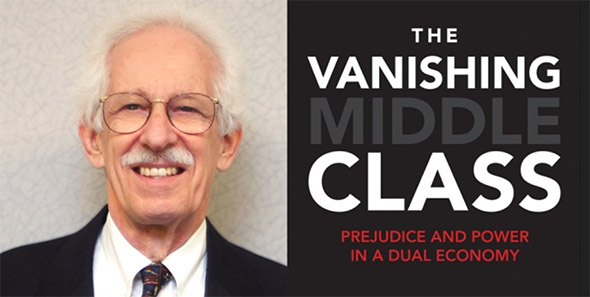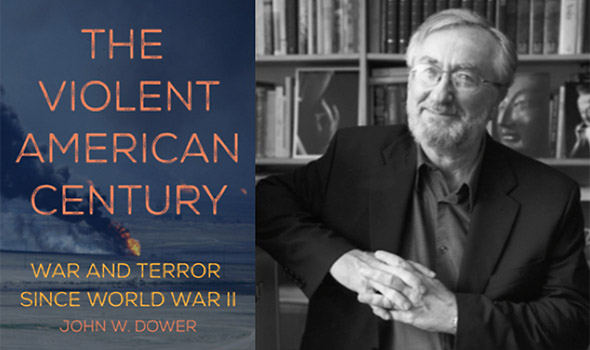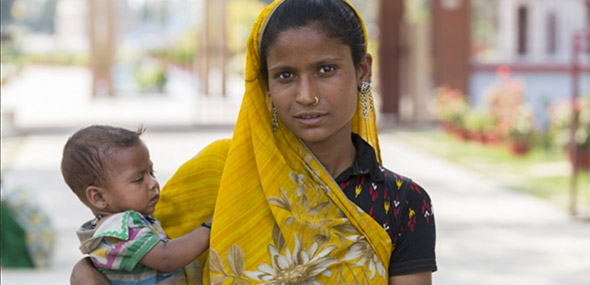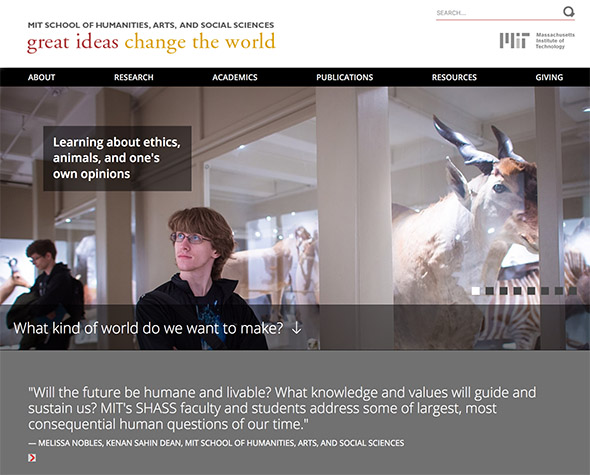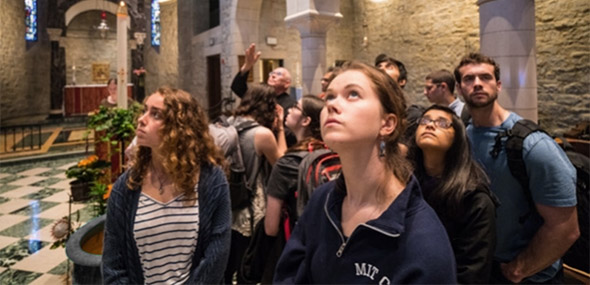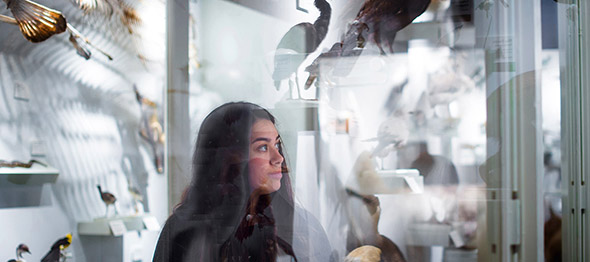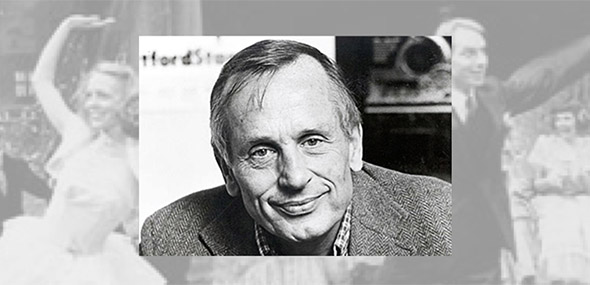Said and Done
Summer 2017
Published by the Office of the Dean
MIT School of Humanities, Arts, and Social Sciences

QUOTABLE
“The people in this country are the resource we have. If we maintain the character of our fellow citizens, that is really our national strength.”
— Peter Temin, Elisha Gray II Professor Emeritus of Economics, author of The Vanishing Middle Class, Prejudice and Power in a Dual Economy
RESEARCH
To see all current SHASS research stories, visit Complete Research July 2017
URBAN TRANSPORTATION
A simple solution for terrible traffic | Olken, Kriendler
“HOV policies on central roads were making traffic everywhere better, both during the middle of the day and on these other roads during rush hour,” MIT economist Ben Olken observes.
Story at MIT News
POLITICAL SCIENCE | ENERGY POLICY
Strengthening public support for renewable energy policies | Warshaw
New research by MIT political scientist Warshaw and Leah Stokes PhD '15, shows that the design and framing of renewable energy policies can strengthen public support. Learning about the clean air and job creation benefits increases public support for renewable energy policies.
Story by Peter Dizikes at MIT News
INEQUALITY | ECONOMICS
America's two-track economy | Peter Temin
In The Vanishing Middle Class: Prejudice and Power in a Dual Economy. Temin tackes the causes of poverty in the U.S., examining racism and substandard education, as well as the lack of a proactive infrastructure program. And he proposes solutions: expanding access to public education, investing in infrastructure, and forcefully confronting institutional mechanisms that perpetuate racial inequality.
Story at MIT News by Peter Dizikes | Story at The Atlantic | Story at Salon
“The link between the two parts of the modern dual economy is education, which provides a possible path that children of low-wage workers can take to move into the FTE (finance, technology, electronics) sector.”
— Peter Temin, Elisha Gray II Professor Emeritus of Economics
ABDUL LATIF JAMEEL POVERTY ACTION LAB + MEDIA LAB
Why do some neighborhoods improve?
The density of highly-educated residents, rather than income or ethnic composition, predicts revitalization.
Story at MIT News
EDUCATION ECONOMICS
Testing the metrics | Joshua Angrist and Parag Pathak
Researchers in the SHASS-based School Effectiveness and Inequality Initiative (SEII) refine the yardstick for measuring schools and teachers.
Story by Peter Dizikes at MIT News
HISTORY
Is the Pax Americana truly peaceful? | John Dower
Dower, the Ford International Professor of History Emeritus, has won the Pulitzer Prize and National Book Award during a career researching topics such as the extreme brutality of World War II combat and the reconstruction of postwar Japan. Today, Dower is skeptical that we have made much progress in matters of war and security since that time.
Story by Peter Dizikes at MIT News
“We’re in a perpetual cycle of violence in the name of preventing violence.”
— John Dower, Ford International Professor Emeritus of History
SECURITY STUDIES | CYBERSECURITY
Patching the electric grid | Joel Brenner
"For the sake of efficiencies … we have created tremendous risk for ourselves," warns Joel Brenner, the principal author of the MIT report on cybersecurity. Now, he says, people are waking up to the danger.
Story at Technology Review
GLOBAL POVERTY ALLEVIATION
How J-PAL thinks globally and acts locally
Can an effective antipoverty program work in different cultural and physical settings? A new report presents a user’s guide to a tough issue.
Story at MIT News
It is a huge question in development economics: If a program yields good results in one country, will it work in another? And why or why not? In a new article, two J-PAL directors unveil the lab’s approach.
FEATURE | WEBSITE
We've updated the MIT SHASS website.
You'll find that the School's website is now responsive across multiple digital platforms, has a new, info-rich, scrolling homepage, simplified organizational categories, and new features, including: resource channels for faculty, students, and visitors; a guide to SHASS faculty expertise; an expanded research section; and a map showing MIT's SHASS research around the globe.
Explore the new site
STUDENT FEATURES
ARTS AT MIT
2017 recipients of the Wiesner Student Art Awards
Meet MIT students who excel in piano, Shakespeare, visual arts, dance, and theater arts design. The 2017 recipients of the Wiesner Student Art Awards — Jacob Gunter, Nathan Gutierrez, Rachel Osmundsen and Hallie Voulgaris — have each integrated the arts into the undergraduate experience at MIT in a different way.
Story by Sharon Lacey
ANTHROPOLOGY
In search of a meaningful life
In a popular MIT anthropology course, 21A.157 (The Meaning of Life), students discover ways that cultures find purpose and meaning — and how to make space for contemplating their own values. “It seemed fascinating to have a structured and guided discussion forum for that conversation,” says Zareen Choudhury, a senior in electrical engineering and computer science.
Story by Meg Murphy
“Students hear all the time that they’re going to change the world,” says Heather Paxson, Professor of Anthropology. “They feel a lot of pressure. They want to explore what that really means. How do you change the world for the better? What does it mean to do that well?”
GLOBAL STUDIES AND LANGUAGES
Mira Partha and Sefa Yakpo win 2017 Isabelle de Courtivron Writing Prizes
Partha was awarded the First-Place Prize for “Of Swarams and Arpeggios,” a meditation where song serves as a metaphor for a hybrid cultural identity. Yakpo was awarded the Second-Place Prize for “If the Label Sticks” a poetic and engaging portrait of her life.
Story at Global Studies and Languages
LABOR ECONOMICS
Investigating the trap of unemployment | Aicha Ben Dhia
Economics PhD student Dhia studies France’s labor market from the perspective of local job-seekers.
Story at MIT News
HISTORY + ANTHROPOLOGY
People and other animals
In a seminar taught by Conner Professor of History Harriet Ritvo — a pioneer in the field of animal-human cultural studies — MIT students explore shifting ideas about animal intelligence, the human moral obligations to animals, and the human uses of animals throughout the ages — while also learning how to form and articulate their own opinions.
Story by Meg Murphy
“In most engineering classes, you are told how things work. This class is more about interpreting meaning.”
— Veronica Padron '17, AeroAstro major
PHILOSOPHY
Breaking down walls between the ivory tower and prison | Lee Perlman
The MIT Prison Initiative provides an academic framework for undergraduates and local inmates to explore the human condition.
Story by Bettina McGimsey
THEATER ARTS
Featured Video: Bringing “Einstein's Dreams” to life | Neerja Aggarwal '17
Video features highlights from the performance and an interview with Aggarwal, who directed the production. Based on the novel of the same name by Alan Lightman, the play is a collection of thought experiments exploring the boundaries of space and time.
Video by Meg Rosenburg, MIT Video Productions
“It's been a once in lifetime opportunity to create this work with MIT Theater Arts.”
— Neerja Aggarwal '17, MIT Electrical Engineering and Theater Arts graduate
HONORS AND AWARDS
PHILOSOPHY
Professor Donca Steriade named Professor Honoris Causa of the University of Bucharest
The academic board of the Faculty of Letters decided unanimously to bestow the honorary title upon Steriade, an MIT Professor of Linguistics.
University of Bucharest
POLITICAL SCIENCE
Devin Caughey named to Silverman Family Career Development Chair
The chair is effective July 2017 and runs for three years through 2020.
Adam Berinsky named Mitsui Professor of Political Science
The Mitsui Professorship was established at MIT in 1974.
Jeremy Ferwerda wins the 2017 Gabriel A. Almond Award
PhD graduate Ferwerda won the award for the best dissertation in Comparative Politics from the American Political Science Association.
About at the APSA site
Mark S. Bell, PhD '16, awarded the 2017 APSA Kenneth Waltz Award
Bell's dissertation, titled "Nuclear Weapons and Foreign Policy," was awarded the 2017 APSA Kenneth Waltz award for the best dissertation on international security.
Story
NEWS
MUSIC
David Deveau retires from Rockport Chamber Music Festival
Deveau retires from his role as Artistic Director this summer after 22 enormously successful seasons. A distinguished pianist and long-time instructor at MIT, Deveau brought Rockport Music to a new level of excellence and oversaw the creation of the acclaimed Shalin Liu Performance Center.
Story at WBUR-FM Online | Listen: Deveau performs Beethoven's Piano Concerto No. 4 in G Major
CENTER FOR INTERNATIONAL STUDIES
Fravel named acting director of the MIT Center for International Studies
M. Taylor Fravel, associate professor of political science and member of the Security Studies Program at MIT will become acting director of the MIT Center for International Studies while Richard Samuels is on sabbatical leave.
Story at Center for International Studies
LITERATURE + THEATER
A.R. Gurney, acclaimed playwright and longtime MIT professor, dies at 86
An MIT humanities and literature faculty member for 36 years, Gurney was known as an outstanding teacher and inspiring mentor.
Story by SHASS Communications | New York Times tribute to Gurney's life and work
“'Early on, Gurney said, 'I sensed the comforts of civilization — but also its discontents, what you give up. The emotions are carefully trained, ultimately honed, tamped down.' He devoted his life to bringing those feelings to the surface.”
— From the New York Times tribute story
CENTER FOR INTERNATIONAL STUDIES
3 Questions: Justin Steil on the Trump administration travel ban
Assistant professor of urban studies and planning argues immigration is good for the U.S. and that President Trump's executive order threatens national security.
3 Questions: Story by Michelle Nhuch
COMPARATIVE MEDIA STUDIES | THE GAME LAB
Play Labs announces first class of VR/AR startups and demo session
An accelerator program on the MIT campus will showcase 12 startups across a mix of gaming, virtual reality, esports, and augmented reality technologies. The overall focus of the accelerator is on startups that employ “playful tech” in various industries.
Story by Rik Eberhardt
The PlayLabs@MIT demo session will be open to investors, members of the MIT community, and the general public. In addition to the physical event, the session, beginning at 6 p.m. on Aug. 15, will be streamed live via playlabs.tv.
IN THE MEDIA
To see all SHASS media stories, visit Complete Summer Media 2017.
CENTER FOR INTERNATIONAL STUDIES
Former NSA inspector general on talks of U.S.-Russian cybersecurity unit
“We have decades of experience with Russian versions of what it means to cooperate,” CIS senior research fellow Joel Brenner tells NPR’s Morning Edition. “We know what they do. They'd learn what they can about our tactics, our strategy and our tools. And they'd give us nothing we don't already know in return.”
Story at NPR
POLITICAL SCIENCE | MIT ELECTION DATA AND SCIENCE LAB
Election experts see flaws in the voter commission plan
MIT political scientist Charles Stewart III explains the complications and dangers of the Trump administration’s voting commission effort.
Story at CNBC
POLITICAL SCIENCE
Not one state supports the Republican health bill
MIT political scientist Christopher Warshaw co-authors an article at The New York Times blog “The Upshot,” writing that “Republicans have produced a rare unity among red and blue states: opposition to the A.H.C.A.”
Story at The New York Times | Related story at Huffington Post: GOP health care bill historically unpopular
ECONOMICS
Republicans say Medicaid doesn't work, so it should be cut. Here's why they are wrong. | Jonathan Gruber and Amy Finkelstein
The LA Times cites research by MIT economists Amy Finkelstein ad Jonathan Gruber into the effects of Medicaid expansion in Oregon. They found a reduction in depression, improvements in diagnosis and treatments, as well as the near elimination of economically catastrophic incidents.
Story at the LA Times
Related stories featuring Gruber's healthcare research and analysis:
He’s the one who broke it: Op-Ed at The Washington Post
Medicaid is the main way that we pay for our moms and the disabled to use nursing homes: Story at WGBH
The challenges in setting up a California single-payer system are not insurmountable: Story at the LA Times
CLIMATE
Leaving the Paris climate accord could lead to a public health disaster
Under the Paris accord, ratified thus far by 147 parties or nations, the U.S. pledged to cut its greenhouse gas emissions to 26 to 28 percent below 2005 levels by 2025. Clean energy policies decrease not only carbon pollution linked to climate change but also other types of pollution that harm human health, such as sulfur oxides, nitrogen oxides, and fine particles that can damage the airways of humans and other organisms.
Undark magazine | Scientific American Online

Photo: Wisconsin Department of Health Services
Fossil-fuel combustion is linked to increases in a wide range of health problems, including asthma and other respiratory disorders.
ECONOMICS
Rising inequality may be the real risk of automation | David Autor
Bloomberg reports on new research co-authored by Autor: “Although the raw count of jobs available in industrialized countries is roughly keeping pace with population growth, many of the new jobs generated by an increasingly automated economy do not offer a stable, sustainable standard of living.”
Story at Bloomberg
Related stories featuring Autor's analysis:
Will the robots steal our jobs? Maybe: Story at The Washington Post
The backlash against globalization: Story at The Huffington Post
Robots are eating money managers' lunch: Story at Bloomberg
ECONOMICS AND RETAIL COLLAPSE
The looming retail bailout | Amy Glasmeier
Recently, the retail industry has shown downward trends with predicted store and business closures. A look at the economic consequences of retail collapse uses the model developed by economist Amy Glasmeier for determining the earnings needed by families to cover essential costs without government help.
Story at Forbes
ROBOTICS, WAGES, AND PRODUCTIVITY
Is automation helping or hurting the economy? | Daron Acemoglu
Despite the increase in automation and robotics, productivity is at an all time low. In addition, the use of robots in manufacturing is having long-term negative effects on jobs and wages, according to research by MIT economist Daron Acemoglu.
Podcast at WBUR
Related stories featuring Acemoglu's analysis:
The robot takeover is greatly exaggerated: Story at Blooomberg
Why aren't robosts boosting economic productivity: Story at The Boston Globe
Skills gap in the U.S.: Story at Bloomberg
SOCIAL EQUITY AND AVOIDING ECONOMIC DISASTERS
Earth 2.0: What would our economy look like? | Abhijit Banerjee
Ford International Professor of Economics, Abhijit Banerjee offers his expert advice for avoiding economic disasters. “Having an underclass that’s resentful and excluded is a disaster.” Banerjee says. “The salient issue of today is income distribution.”
Video and transcript at Freakonomics WGBH
JOBS AND ROBOTICS
Making the machines that replace humans | Daron Acemoglu and David Autor
The number of industrial robots increased fourfold between 1993 and 2007, according to a recent study by MIT economists Daron Acemoglu and Pascual Restrepo. The authors found that one such industrial robot in a metropolitan area reduced employment by about six workers, costing the U.S. economy 670,000 jobs between 1990 and 2007. But there are positives too. The MIT economist David Autor has emphasized that automation also complements labor, making workers more productive. There are certain tasks that robots can't do, he writes, and humans will always be needed for those.
Story in The Atlantic
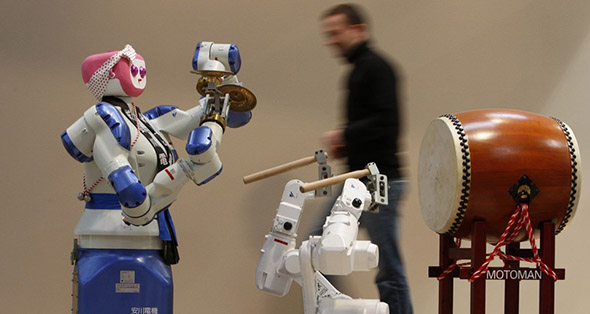
Photo: Reuters, in The Atlantic
SOCIAL EQUITY
Some top political science journals are biased against women. Here's the evidence. | Kathleen Thelen
Study co-written by Thelen collects information on all articles published by 10 top journals over the past 15 years. The data shows that they publish a lower proportion of articles written by women than there are women in the discipline as a whole.
Story at The Washington Post
TEACHING AND LEARNING
Grad students as peer reviewers: the pros and cons | Kai von Fintel
As von Fintel, an MIT linguistics professor and co-founding editor of the journal Semantics & Pragmatics, wrote on Daily Nous: “If I need a second reviewer on, say, embedded imperatives in Slovenian, and it turns out that one of the world's foremost experts on that is an advanced graduate student … it would be a disservice to the field not to call on that expertise.”
Chronicle of Higher Education
GLOBAL STUDIES & LANGUAGES
Taiwan: an island history | Emma Teng
Professor of Asian Civilizations, Emma Tang, discusses Taiwan’s “rich and surprising” history with Forum host Bridget Kendall.
Video and story at BBC: The Forum
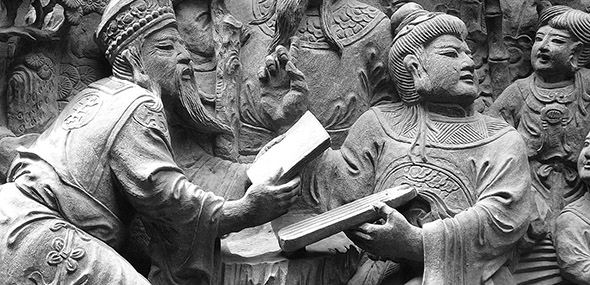
Detail, City god temple, Hsinchu, Taiwan (Wikipedia)
STAY IN TOUCH
Follow us
About the School
Mission
SHASS stories on MIT News
Bookmark this page
Publications Directory
Portal to all MIT SHASS publications
MIT Campaign for a Better World
Story | Join Us
Said and Done is published by the Office of the Dean
MIT School of Humanities, Arts, and Social Sciences
Editor and Designer: Emily Hiestand, Director, SHASS Communications
Publication Associate: Daniel Evans Pritchard, SHASS Communications
Published July 20, 2017
